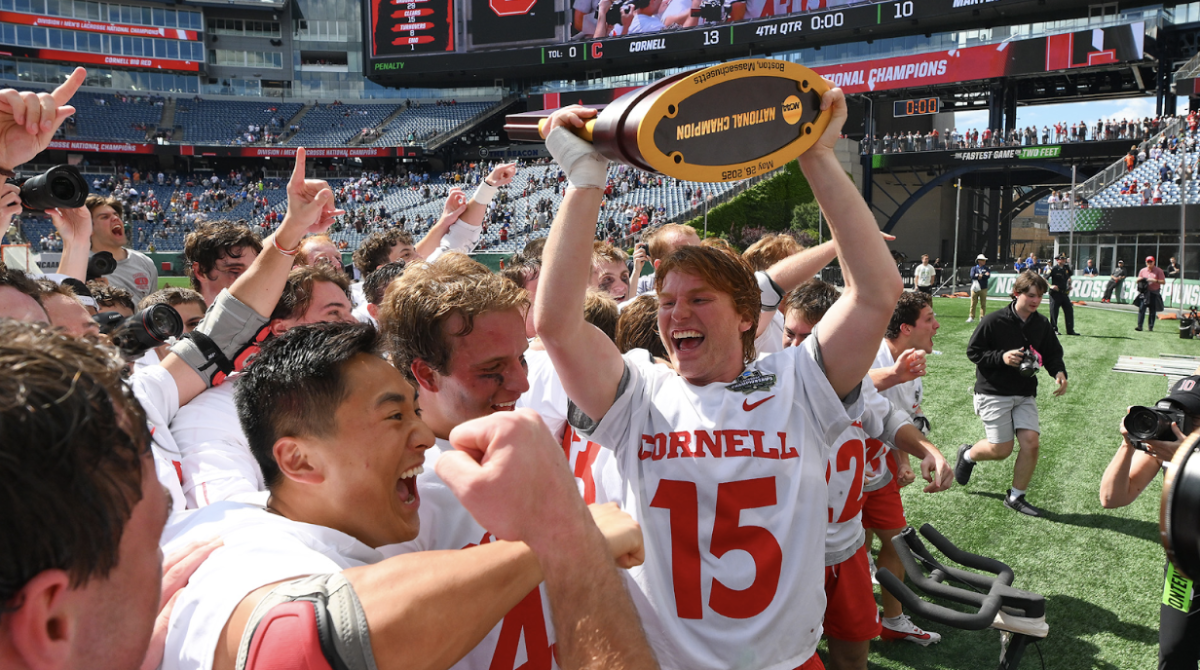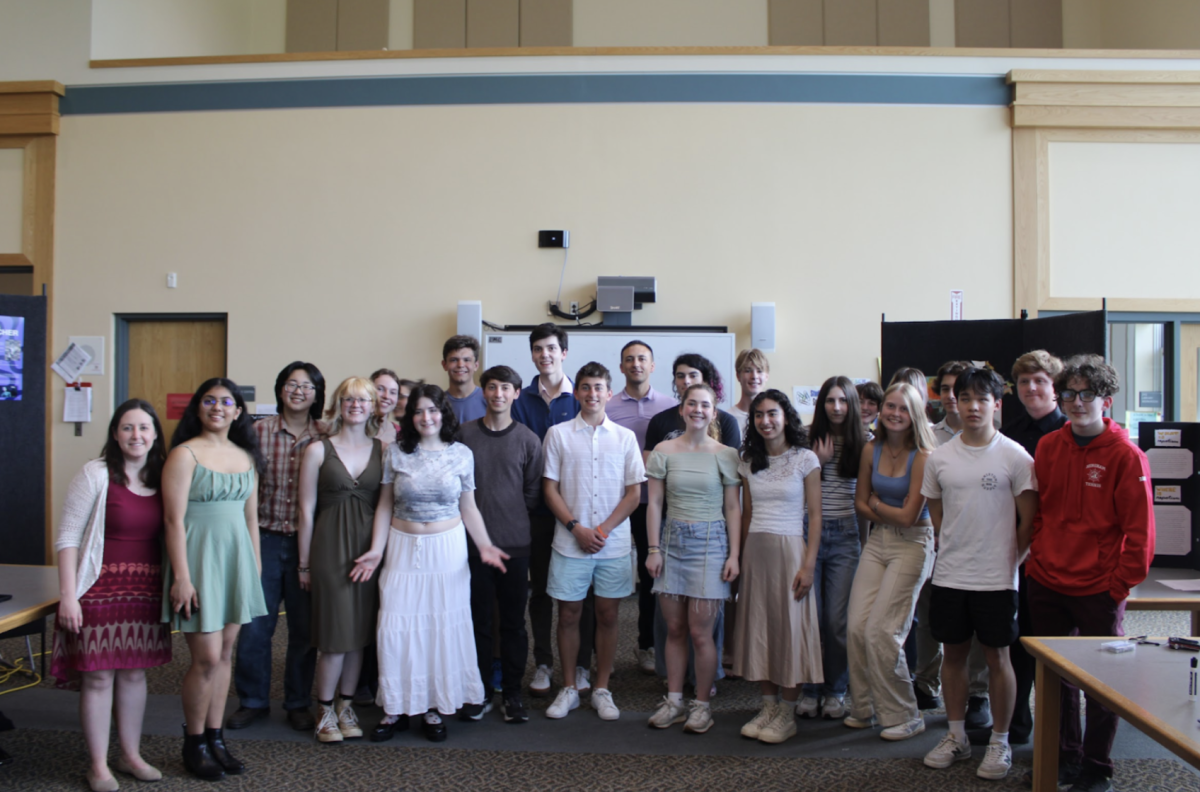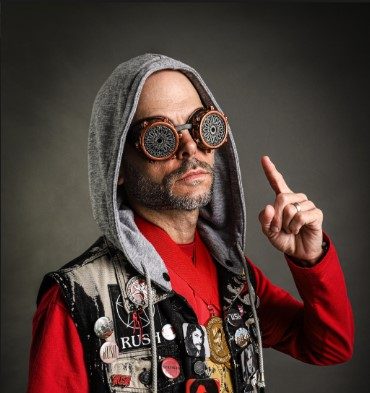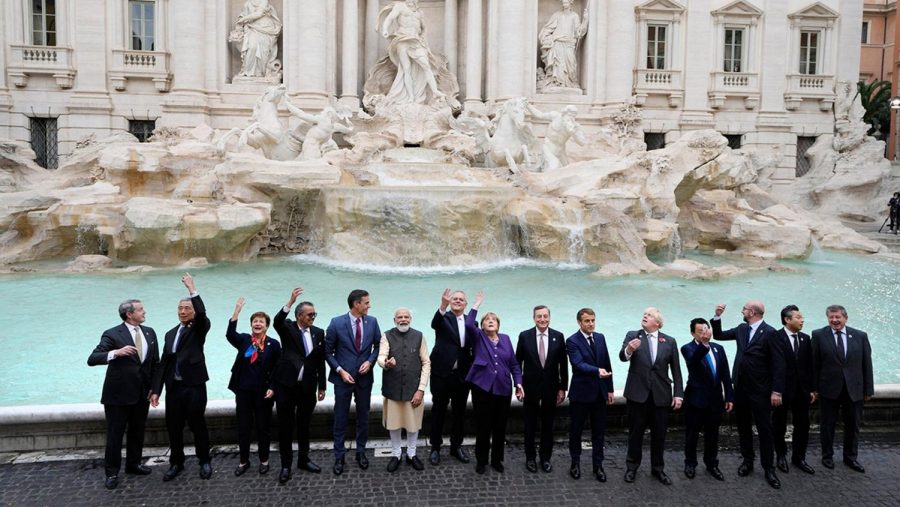G20 Leaders Recognize Need for Action Against Climate Change, but Fail to Make Concrete Goals
G20 leaders pose in front of the Trevi Fountain during the summit in Rome on October 31.
November 16, 2021
On Saturday and Sunday, world leaders from the Group of 20 Nations (G20) met in Rome to discuss issues facing the world economy. Climate change took center stage, many believe world leaders are not doing enough to stop these crises.
The G20 is made up of the world’s top twenty economies, comprising 19 countries plus the European Union. These nations are responsible for 85% of the world’s economic output, hold roughly two-thirds of the global population, and have the largest impact on climate change. This was their first in-person meeting since the commencement of the pandemic, yet there were some notable absences: Chinese President Xi Jinping, Russian President Vladimir Putin, Mexican President Andrés Manuel López Obrador, and new Japanese Prime Minister Fumio Kishida.
This meeting was the first of two back-to-back summits; on Monday, world leaders traveled to Glasglow, Scotland, for the COP-26 summit, which will last until November 12. Unlike the G20 talks, COP-26 is being attended by over 120 nations representing both wealthy and underdeveloped economies.
The climate summit began Saturday morning on October 30th, with intense security protocols. Roman police had to forcibly remove a gathering of thousands of protestors from outside the site of the summit. The activists, known as Climate Camp, claimed their presence was due to the “wholly inadequate” actions of world leaders in response to “the catastrophic scenarios that we can see in our present and future on this planet.”
During the first session, world leaders unanimously agreed on the development of a global minimum tax. This would require large corporations to pay at least 15% on overseas profits; this money could help go towards efforts to curb climate change.
G20 leaders were also able to agree for the first time on the importance of limiting climate change from surpassing an increase of 1.5ºC. According to scientists, keeping climate change from surpassing this level would prevent the most catastrophic consequences. World leaders must reach net-zero carbon emissions (a process also referred to as becoming carbon neutral) before 2050.
In line with past decisions, the G20 also committed to giving an annual payment of $100 billion to poorer countries to help them cope with climate change.
The final communique claimed that G20 leaders will “accelerate [their] actions across mitigation, adaptation, and finance, acknowledging the key relevance of achieving global net-zero greenhouse gas emissions or carbon neutrality by or around mid-century.”
Although all world leaders agree on the importance of “meaningful and effective” action against climate change, the final statement failed to make concrete goals. It set no plan for phasing out reliance on fossil fuels, included watered-down wording on a promise to reduce methane emissions, and lacked a specific or urgent deadline for action.
Instead, the summit largely leaves it up to individual nations on how to proceed. Some, including the U.S., have set 2050 as their goal for carbon neutrality, while others, like China, Saudi Arabia, and Russia, aim for 2060.
These resolutions are unsatisfactory to many, especially young people. According to senior Catelyn Arnold, “billionaires should start providing money as well. There are plenty of celebrities who have the means to make a change… They have billions and trillions of dollars when the UN said they only need half a billion or less to make real turnarounds in the climate crisis. Yet no one like Bezos or Zuckerburg or the Kardashians seem to be offering to help even when they have the money to.” Arnold believes this “is very frustrating to people who are trying to help in small ways but can’t make as big of a difference.”
Hingham High senior Alex Denning agrees. She says, “I think they’ve been treating it like a back-burner problem when it is a huge problem.” In terms of a solution, she thinks world leaders should “create more climate laws and enforce faster change,” and “put more money into alternative energy.”
Sophomore Kate Swanson doubts leaders genuinely care about the welfare of the planet, saying that “the whole flipping the coin thing just seemed like a publicity stunt” and the inaction has been making her climate anxiety go “up, up, up.” She feels like “teenagers and young adults are doing more to help the earth than our leaders.”
The opinions of the world’s young people, including Hingham High students, appear to be well summed up by an open letter to the media published by activists Greta Thunberg and Vanessa Nakate. Their message stresses three important things that G20 leaders fail to take into account: time is running out, solutions must address populations most impacted by climate change, and the biggest polluters often lie about their real emissions.
As Thunberg said in a now-viral speech to the Youth4Climate summit in Milan last September, “Blah blah blah. This is all we hear from our so-called leaders. Words that sound great but so far have not led to action.
“Our hopes and ambitions drown in their empty promises.”

































